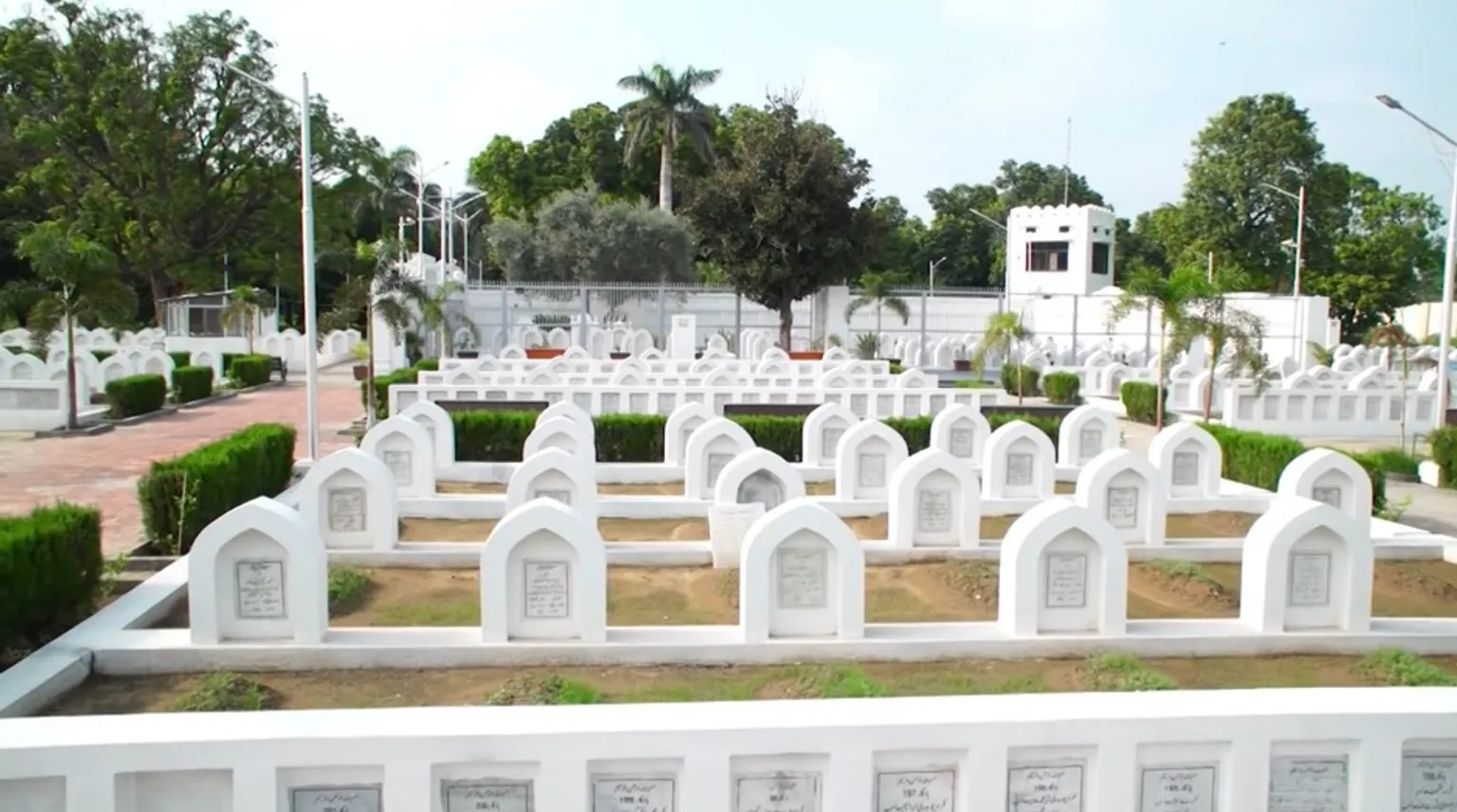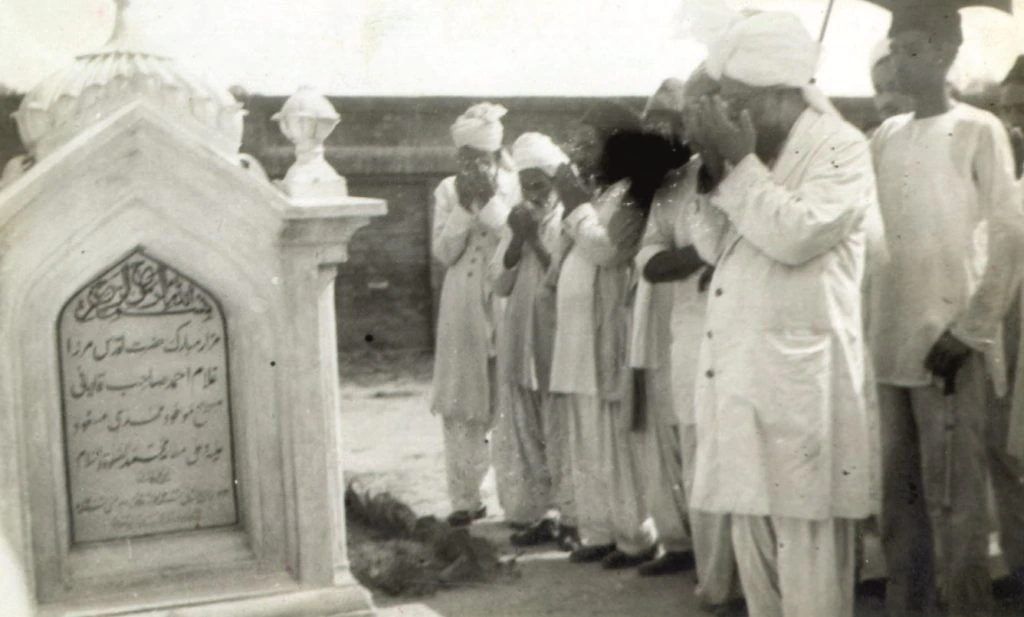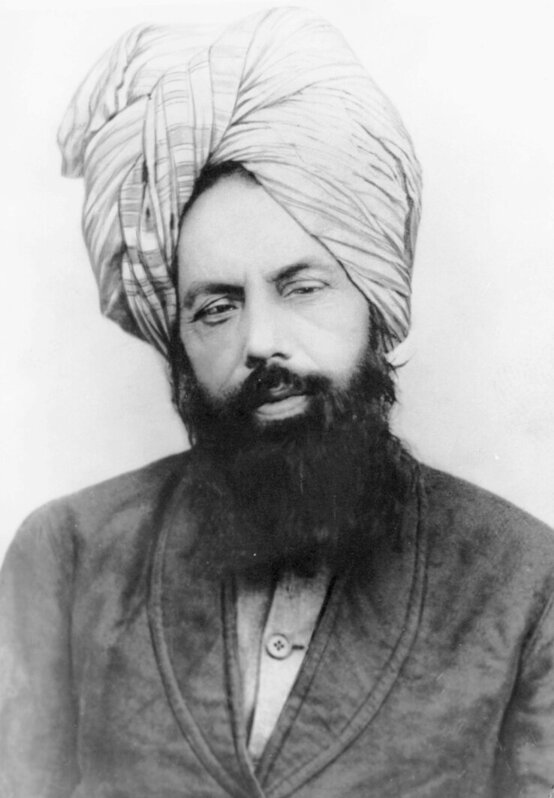How did Mirza Ghulam Ahmad (as) die? An Analysis of the Facts

By Missionary Hassan Selby
Allegation: Died a Disgraceful Death
One of the vilest allegations some non-Ahmadi Muslims have levelled against the Promised Messiah (as), is the claim that he died on the toilet.
This allegation appears to have arisen due to a deliberate misrepresentation of the writings of Mirza Yaqub Beg, one of the doctors that attended to the Promised Messiah (as) in his final hours. Mirza Yaqub Beg states:
“It was at two o’clock at night [on 26 May 1908] that Hazrat Mirza sahib sent for me in this state of illness. When I arrived, he was sitting on the toilet seat. He said to me: ‘Mirza sahib, recommend a medicine for me’. Then he said: ‘Also pray for me’, and he added: ‘In truth, the medicine works by decree from heaven.’
When he died, he was remembering his True Master, Allah, in the words: ‘O my Beloved, O my Beloved’. It was with the love of Allah that he was entirely intoxicated and it was to Him that he went in the end.”
Paigham-e-Sulh, p. 9, 26 May 1923
Expanding on this, it is claimed that a true Prophet, Messiah, Mahdi and Reformer of the age should have been protected by God from suffering such a disgraceful death. They claim that such a death is an accursed death, and that it is recognised as a sign of his falsehood.
Our Response
In response to this allegation, some excellent answers have already been published in the Review of Religions magazine and Al-Hakam newspaper. This article summarises some of their key points, and analyses the ramifications of such an allegation.
Firstly, it should be noted that none of the people who allege that the Promised Messiah (as) died a disgraceful death on the toilet were present at the time of his death. The eye witnesses that were present inform us that the Promised Messiah (as) passed away at 10:30am whilst his tongue was busy with the remembrance of Allah, in his bed.
Hazrat Mirza Bashiruddin Mahmood Ahmad (ra) was a son of the Promised Messiah (as) who witnessed his death. In his book, ‘Hadhrat Ahmad’ (pages 58-59), he wrote that the Promised Messiah (as) had travelled to Lahore, despite being ill, in the last days before his death so that he could write a lecture entitled, ‘A Message of Peace’. Through this lecture, the Promised Messiah (as) attempted to build bridges of dialogue between the Muslims and Hindus of India. When his health deteriorated greatly, he called for his wife who tended to him and also asked her to call for Hazrat Maulvi Noor-ud-Din (ra), Mahmood (his son giving the testimony) and Mir Sahib (his father in law). His son then stated:
“I found him very restless. The doctor had already come and given what help he could. But he did not rally. At last an injection was given. Then he fell asleep. When it was dawn, he woke up and performed his morning prayers. His throat was completely hoarse. He tried to speak but could utter no sound. He called for pen and ink but could not write. The pen dropped from his hand.
He then lay down. Soon drowsiness came upon him. At about half-past ten, his holy spirit passed away to the presence of the August Sovereign, to the service of whose religion he had devoted the whole of his life. To Allah we belong and to Him shall we return. All through, there was one word upon his lips; and that word was ‘Allah.’”
Hadhrat Ahmad, pp. 58 – 59

Another eyewitness to the noble death of the Promised Messiah (as) was his second son — Hazrat Mirza Bashir Ahmad (ra). He also wrote an account of the final moment of Hazrat Mirza Ghulam Ahmad (as) in his book ‘Silsila Ahmadiyya Volume 1’;
“On 25th May, after offering Maghrib and Isha’a prayers and taking some food, his father went to bed. At around 11pm, he felt the need to use the privy for defecation. He would often suffer from an upset stomach and diarrhoea. He had a loose motion and consequently felt weak. He woke up his wife, who immediately got up to look after him and started massaging his feet. Soon after, he felt the need to use the privy again. When he returned, he was weak to such an extent that while he was about to lie down on his bed, he was not able to support his own body weight and almost fell on his own bed. Soon his eldest son and two doctors were also summoned to his bedside and all possible humanly efforts were made to save him.
Due to his weakness, Ahmad (as) was also having trouble speaking. The only words that could be heard from him were ‘O Allah, my Dear Allah’. I (Hazrat Mirza Bashir Ahmad) was standing by him at the time of Fajr prayer. After inquiring whether it was time for prayer, he performed Tayammum and tried to offer his prayer in bed. But he fell unconscious. After regaining consciousness, he again inquired about Fajr prayer and offered his prayer while lying down in his bed. He was becoming weaker by the moment and all you could hear were the words, ‘O Allah, my Dear Allah!’ At last, at about 10:30am, with his family by his side, he breathed his last, and his soul departed from this world towards Allah.”
Silsila Ahmadiyya, Vol. 1
From both of these accounts, we learn that the Promised Messiah (as) died at 10:30am while engaged in the remembrance of Allah, on his bed. Upon studying the quotation of Mirza Yaqub Beg mentioned at the start of this article, it is clear that he mentioned that Hazrat Mirza Ghulam Ahmad (as) was on a commode when he arrived, at approximately 2 o’clock in the morning. However, there is no mention that he remained on that commode up until and including the time of his death, some eight and a half hours later. This is merely a baseless assertion on the part of those who seek to falsify his claim by alleging that he died an accursed death.
It is no secret that Hazrat Mirza Ghulam Ahmad (as) suffered from illnesses such as diarrhoea, as did almost everyone in India at the time given the lack of public sewage works. But this did not stifle him in carrying out his duties as the Promised Messiah and Mahdi, nor has it been stated by any eyewitness that he passed away on the toilet. Rather, in his last days, he was as committed to uniting humanity with their Creator, as he had been all his life. He was busy trying to establish peace between Muslims and Hindus while ever in a state of remembering God. While analysing this allegation, our focus should be on the actions of the Promised Messiah (as) which speak louder than the vilification levelled against him.
Similar Death to Prophet Muhammad (sa)
In fact, this allegation which is hurled at the Promised Messiah (as) is no better than a similar allegation that has been hurled against the Holy Prophet Muhammad (sa), especially by Christian missionaries. When the Holy Prophet (sa) was near death, he too fell severely ill and was bed-bound for a number of days. Indeed, Hazrat Aisha (ra), the wife of the Holy Prophet (sa) said:
“I never saw anybody suffering so much from sickness as Allah’s Messenger.”
Sahih Al-Bukhari, vol 7, book 70, hadith no. 549
The Holy Prophet (sa) himself said:
“If Allah wants to do good to somebody, He afflicts them with trials.”
Sahih Al-Bukhari, vol 7, book 70, hadith no. 548
There is yet another narration of the Holy Prophet (sa) in this regard;
“I visited the Prophet (sa) during his ailments and he was suffering from a high fever. I said, “You have a high fever. Is it because you will have a double reward for it?” He said, “Yes, for no Muslim is afflicted with any harm but that Allah will remove his sins as the leaves of a tree fall down.”.
Sahih Al-Bukhari, vol 7, book 70, hadith no. 550
From these narrations of the Holy Prophet (sa) it becomes apparent that rather than the Promised Messiah’s (as) illness being a source of mockery or disgrace, it is actually a source of Allah’s blessings upon him similar to the blessings upon the Holy Prophet (sa) and all true Muslims.
With regards to the commode that was used by the Promised Messiah (as) close to his death, a similar situation is also found near the Holy Prophet (sa) close to his death:
“The Prophet (sa) had a wooden vessel under his bed in which he would urinate at night.”
Sunan Abi Dawud, Book 1, Hadith 24
Nothing further needs to be mentioned in this regard. If there are certain Muslims who would raise an allegation against the Promised Messiah (as) for being ill and needing to relieve himself frequently before his death, then the same allegation would also be true of the Holy Prophet Muhammad (sa), God forbid. Through this logic, certain Muslims are indirectly insulting the Holy Prophet Muhammad (sa).
Indeed, there are many people who become ill and suffer greatly when they become old or at the time near their death but this does not detract from the way they conducted their lives or make them all accursed. Such inhumane thinking is characteristic of those whose hearts have become hardened through the rejection of God’s Prophets.
Many individuals reading this article would have known a family member or loved one who was admitted to hospital before their death and may have needed to relieve themselves with a bedpan. However, this would in no way detract from our reverence and respect for the loved one or lead us to believe that their life must have been full of shame. It is a natural process and we should rather focus on the life achievements of people and the manner with which they conducted their lives rather than their frequency of bowel movements immediately before their death.
Similar Allegations Against ‘Isa (as) and Muhammad (sa)
Hazrat ‘Isa (as)
In fact, the non-Ahmadi Muslims who claim that Hazrat Mirza Ghulam Ahmad (as) died in an accursed manner, on the basis of this false accusation, have actually fulfilled another similarity between the first Messiah Hazrat ‘Isa (as) [Jesus] and the second Messiah, Hazrat Mirza Ghulam Ahmad (as). This is because Hazrat ‘Isa (as) was sent to the Jews and the Jews claimed that he too died an accursed death through crucifixion. In Deuteronomy 21: 22-23 we find:
“And if a man have committed a sin worthy of death, and he be put to death, and thou hang him on a tree: His body shall not remain all night upon the tree, but thou shalt in any wise bury him that day; (for he that is hanged is accursed of God;) that thy land be not defiled, which the Lord thy God giveth thee for an inheritance.”
Deuteronomy, 21:22-23, King James Version
Thus, the crucifixion of Hazrat ‘Isa (as) was attempted to prove that he was not from God, by subjecting him to an accursed death.
Similarly, Hazrat Mirza Ghulam Ahmad (as) was sent to the Muslims and it was the Muslims who attempted to ascribe an accursed death to him. Their intent behind this was to falsify his claim by stating that a true man of God would be saved by God from dying in an allegedly shameful manner. Therefore, this similarity becomes yet another proof of the truth of Hazrat Mirza Ghulam Ahmad (as) as being the metaphorical second coming of Hazrat ‘Isa (as).

The Holy Prophet Muhammad (sa) prophesied this condition of some of the Muslims when he said:
“What befell the children of Isra’il will befall my Ummah, step by step, such that if there was one who had intercourse with his mother in the open, then there would be someone from my Ummah who would do that. Indeed the children of Isra’il split into seventy-two sects, and my Ummah will split into seventy-three sects. All of them are in the Fire except one sect.”
He was asked: “And which is it, O Messenger of Allah?” He said: “What I am upon and my Companions.”
Jami’ Al-Tirmidhi, Vol 5, Book 38, Hadith 2641
From this saying of the Holy Prophet Muhammad (sa) it is clear that a time will come when some Muslims will be guilty of performing all the sins that the Jews were guilty of committing in the past. This sin of seeking to falsify the claim of their Messiah by spreading misinformation about his death is no exception. The Holy Quran has highlighted this sin in particular, amongst a list of other sins that were committed by the Jews as collectively being the reason that the Jews were later deprived of Allah’s blessings. The Holy Quran states:
“So, because of the transgression of the Jews, we forbade them pure things, which had been allowed to them, and also because of their hindering many from Allah’s way.”
Holy Quran 4:161
One interpretation of the above Quranic statement is that the “pure things” denied to them, were God’s spiritual favours. After this attempt of the Jews to attribute an accursed death to Jesus, no further Prophets were sent to them by Allah. Instead, Allah established the religion of Islam and sent Messengership to the followers of Islam. Therefore, this was an extremely serious sin that was performed by some Jews which has unfortunately been replicated by some Muslims in fulfilment of this prophecy of the Holy Prophet Muhammad (sa).
From the very outset of the Holy Quran, the Muslims have been taught to seek Allah’s guidance against replicating the mistakes of the Jews, who therefore incurred Allah’s displeasure. The Holy Quran states:
“Guide us on the right path. The path of those upon whom You have bestowed Your blessings, not of those who have incurred Your displeasure, nor of those who have gone astray.”
Holy Quran 1:6-7
Prophet Muhammad (sa)
Indeed, we should not believe everything that we read or hear without doing proper research on the subject. If we search the internet for ‘how the Holy Prophet Muhammad (sa) died’, we will be surprised to find many articles claiming that he died from poisoning. Upon investigating, we learn that there was one incident where the Holy Prophet Muhammad (sa) was given some meat that was laced with poison by a Jewish lady after the battle of Khaybar (four years before he died). She did so, in order to test his prophetic claim, by seeing whether God would protect His Messenger. However, as the Holy Prophet Muhammad (sa) took a mouthful, he was informed by God that this meat was poisoned. He spat out the food and stopped his companions from eating it, who had not yet eaten it, and was thus saved. One of his companions who had already eaten a quantity of the meat unfortunately died. The woman admitted her crime and the reason for it, and seeing that he had survived, accepted Islam. No punishment was given to her.
The misconception surrounding his death stemmed from not understanding one of the ahadith [sayings of the Holy Prophet Muhammad] properly. It may have also stemmed from a lack of medical knowledge. In that statement, the Holy Prophet (sa) complains at the time of his last illness that he could feel a pain that reminded him of the pain from that poison. It is obvious that as time passes, any poison in the body is increasingly eliminated in the case of survival, such that none would remain within months of the incident, let alone four years afterwards. Yet, on the basis of this single narration, unscrupulous Christian leaders have claimed that the Holy Prophet (sa) died of poisoning, four years after the incident!
Regardless of how such a misconception came about, the important lesson we learn is that we should conduct our own research and study a variety of sources when trying to analyse the veracity of an incident. One excellent resource on this topic can be found here.
Conclusion
Our focus should be on the plethora of great achievements that were made by the Promised Messiah (as) rather than deplorably attempting to mock his final hours. The Holy Prophet Muhammad (sa) has even said:
“Do not abuse the dead, for they have reached the result of what they have done.”
Sahih Al-Bukhari Hadith no. 6516
Furthermore, the Holy Quran instructs:
“And do not backbite one another.”
Holy Quran 49:13
Therefore, Islam clearly requires Muslims to not insult the living and especially not the dead. Even for those readers who are not Muslim, good and basic human morals dictate that we should respect one another and not revile the deceased.
Hazrat Mirza Ghulam Ahmad (as) spent his life trying to bring about inter-religious harmony as well as to defend Islam peacefully from any attacks or allegations that were levelled against it. He taught that a living relationship with God was possible for all of mankind who sought it. His noble character continues to be an inspiration for millions even today.
More articles
Contact
National Outreach Department:181 London Rd, Morden SM4 5PT, U.K.
Email: [email protected]Phone: 0208 6877804
@ 2025 Ahmadiyya Muslim Community, All Rights Reserved.